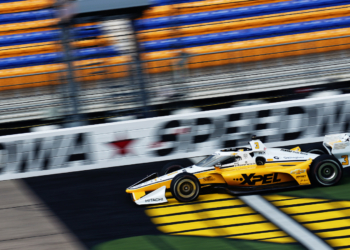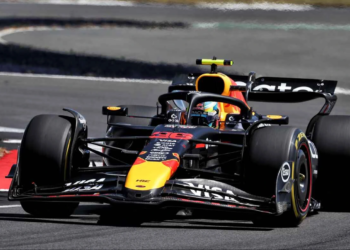As any regular reader of my Motorsport Monday column will know all-too-well, I am a big advocate and fan of Formula E.
I often find motorsport to be an 'old boys club', which, as someone in their early twenties, can be a bit intimidating and even confusing at times. I have never felt this more acutely than when trying to explain why I believe Formula E is the series of the future and, frankly, the place to be in racing right now.
Yet it is not possible to window-dress the series when it faces serious problems that do concern me when it comes to considering its future. A spade's a spade, after all. Sometimes I must recognise that the naysayers may have a point.
While questions about the future of Formula 1 have dominated the newswires for the past week or two amid Liberty Media's takeover of the series and Bernie Ecclestone's departure, Formula E has been facing a minor crisis of its own. I say 'minor' as the issue is nothing but a road bump for a series I still firmly believe to be moving in the right direction – but there is certainly a worrying trend appearing.
Cast your mind back to last summer when the NIMBYs of Battersea Park decided to nuke the annual Formula E race in London. Amid ongoing court disputes, series officials agreed to make the 2016 London ePrix the last to be staged in Battersea Park in the hope of finding a better venue elsewhere. Battersea Park had certainly served a purpose, but ultimately it was a poor spectator venue and hardly conducive to thrilling race.
Formula E CEO Alejandro Agag was not worried when addressing the press after unveiling the season three calendar. There was a slot still reserved for London, on the condition that a deal could be done to find a better venue. Agag was confident the series could, in his words, "do a Berlin".
Berlin hosted Formula E for the first time in season one, with a rudimentary track created at the disused Tempelhof Airport, famous for its role during the Berlin Air Lift that kept the west of the city alive during the height of the Cold War. However, when the site was turned into a centre for refugees fleeing the troubles in the Middle East, Formula E was understandably unable to return for season two.
Instead, a track was laid out in the very heart of the city near Alexanderplatz, with the pit lane formed on the famous Karl-Marx-Allee. It was an unmitigated success for the series, with a buzzing atmosphere around the track as fans flocked to the race. It was the epitome of what Formula E is trying to do: taking clean, eco-friendly racing to city centres in the hope of promoting electric vehicles.

But last week, word filtered through that city officials in Berlin had not shared the enthusiasm for the race. A vote from the city senate ruled against hosting Formula E on Karl-Marx-Allee again in 2017, citing pressures placed on local residents by the event and traffic issues as the main concerns.
Just three days later, officials in the Belgian capital, Brussels, played a similar card. Formula E had already moved the intended location for the July 1 race once before, but was now faced with doing so again after city officials said it could not be held in Koekelberg as planned. While there is an agreement in principle between Brussels and Formula E, it was always conditional to the venue that was used. Efforts are being made to keep the race on the calendar for season three, but delaying its addition until season four seems more likely.
Add in last year's difficulties with London and, as announced last November, the decision to move the Buenos Aires race after season three by virtue of a city decision to redevelop the Puerto Madero area, you can see the trend that is brewing. That’s before you also remember the loss of races in Miami, Punta del Este, Beijing, Putrajaya, Long Beach and Moscow in the past two years – although the circumstances surrounding each of these examples are more complex than the cities themselves saying they've had enough.
Cities are becoming increasingly concerned about the problems supposedly posed by Formula E, as opposed to the benefits. It looks as if they are falling out of love with a very novel and new series.
In a worst-case scenario, neither Berlin nor Brussels will go ahead this year. Should that be the case, Formula E would be reduced to an eight-round, 10-race calendar for season three – or less than nine hours of actual racing across the course of an FIA sanctioned world championship season. There would also be another gaping hole in the calendar between Paris on May 20 and New York on July 15, following on from a stint between the mid-February and mid-May where there is just a single ePrix.
Calendar issues are certainly stacking up, but Agag has always insisted that the season three schedule was a compromise. The plan is for season four to start much later than season three, potentially in December, with Hong Kong once again playing host to the season opener. Hong Kong was a huge success as a debut event, causing minimal disruption to the city and being embraced by the local government. The more cities that embrace Formula E in this fashion, the better. Alas, some are turned off after giving the series a try due to the disruption to its usual functionality that can be caused. As appealing as the event is, the trade-off is unfavourable for the likes of Berlin and Brussels.
It is for that reason that I am concerned about the future of races in Paris, Montréal and New York, the latter two which are yet to hold an inaugural event. Paris was an exciting event last year, taking place in the shadow of the Eiffel Tower and fulfilling a long-held dream for the FIA to have a race in the streets of its home city, yet the spectator experience left much to be desired. New York and Montréal are still to feel what impact Formula E will have on their cities. Holding a race in New York will be a landmark event for global motorsport and to Formula E’s credit, but one can only hope the Big Apple is not turned off long-term by the disruption that could be caused.
Formula E has broken enormous ground by taking motorsport to the very heart of cities, something that championships such as F1 face far greater difficulty in achieving. The question is whether or not it is truly sustainable. Going to Berlin, New York and Montréal is all well and good, but being 'one and done' at venues sends out the wrong message.

It's a shame that Formula E faces these problems, because the on-track spectacle is getting better with every race that goes by. The technology is developing at a rapid rate, and more and more big-name drivers want to be in the series. Esteban Gutiérrez will make his debut in Mexico City and is also set to race in New York, while Felipe Massa tested for Jaguar this week ahead of a possible move into Formula E for season four.
The calendar for season four has already been worked on for some time, with a focus on more Asian rounds already being stressed. Besides Hong Kong, the next most-easterly round on the season three calendar was Berlin, but there is plenty of interest. Agag met with delegations from 15 Asian cities in Hong Kong alone to discuss a possible race for season four, including a number from mainland China. Asia is a huge market for EVs, so having multiple races across such a vast continent is crucial to capture the imagination of possible consumers.
As Formula E seeks stability, date equity is going to become increasingly important. Having a race such as Hong Kong locked in year after year in an early-December slot would be valuable to all parties, much as you know when roughly the majority of F1 races will be each year (start in Australia, Monaco in May, Silverstone in July, etc.). One hopes that other cities can follow suit, otherwise it will be ever-changing calendar; there will be little crossover from season to season. It's far too unstable to even think about building up any kind of consistency for the electric racing category in a host city.
Despite the doom and gloom, Berlin and Brussels may yet happen this year. Berlin is pushing to return to Tempelhof if possible, while Brussels' minister for mobility Pascal Smet and event promoter Stephan Uhada are bidding to get the race back at its originally-planned venue in Heysel. Right now, it's far from game over for both races, particularly in Berlin’s case.
Nevertheless, the uncertainty surrounding races is worrisome to those looking for some kind of stability in Formula E. If this can be curbed, it would be another big victory for the championship as it continues to evolve and look to the future.
This feature first appeared in issue 200 of Motorsport Monday. Subscribe for free by clicking here.






